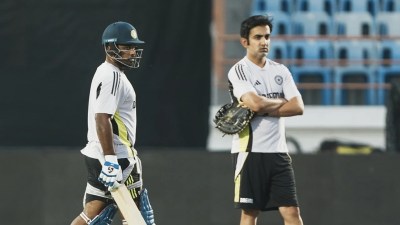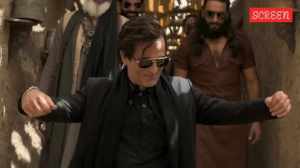‘Mohan and Muhammad’: In final book, Meghnad Desai leaves lasting reflection on Gandhi, Jinnah, and divisions that endure
The posthumous launch of Desai’s final book became a space to revisit Partition and the shared origins of two towering leaders
 A posthumous launch was held for Meghnad Desai’s final book. (Source: meghnaddesaiacademy.org)
A posthumous launch was held for Meghnad Desai’s final book. (Source: meghnaddesaiacademy.org) At the India International Centre on Wednesday, scholars, diplomats, and readers gathered for the posthumous launch of Mohan and Muhammad: Gandhi, Jinnah and the Break-up of British India (Rupa Publications) — the final work by economist and academic Lord Meghnad Desai.
The event — part book launch and part memorial – was also a celebration of Desai. Mohan and Muhammad, published after Desai’s death earlier this year in July, examines the intertwined lives of Mahatma Gandhi and Muhammad Ali Jinnah – two men born in the same region, shaped by similar struggles, yet divided by history.
‘An undying spirit to write’
The evening opened with tributes from Kishwar Desai, author and wife of Desai, who recalled her husband’s undying spirit to write. “He would wake up each morning with a song in his head and an idea that had to be written. His courage to speak the truth mattered deeply to him,” she said.
 Remembering Meghnad Desai through his final book, Mohan and Muhammad: Gandhi, Jinnah and the Break-up of British India, which is a meditation on Gandhi, Jinnah, and the unfinished story of Partition.
Remembering Meghnad Desai through his final book, Mohan and Muhammad: Gandhi, Jinnah and the Break-up of British India, which is a meditation on Gandhi, Jinnah, and the unfinished story of Partition.
The panel discussion, moderated by journalist Marya Shakil, featured TCA Raghavan, former High Commissioner to Pakistan, MP and former Union Minister Manish Tewari and Teamwork Arts Managing Director Sanjoy K Roy. Each offered a distinct interpretation of the book and the history it revisits.
On Partition
Shakil framed the conversation around the author’s attempt to humanise the two figures often cast in opposition. Tewari said that the book’s power was in its treatment of Partition as a living wound. “This is a story of the final moments of a great rupture that still hasn’t been fully told …. In Punjab, we don’t call it Partition — we call it ujara (devastation).” Ambassador Raghavan, who is also an author, said that the book is a “meditation on how two men, shaped by similar contexts, came to represent two opposing ideas of nationhood”.
- 01
- 02
- 03
- 04
- 05































